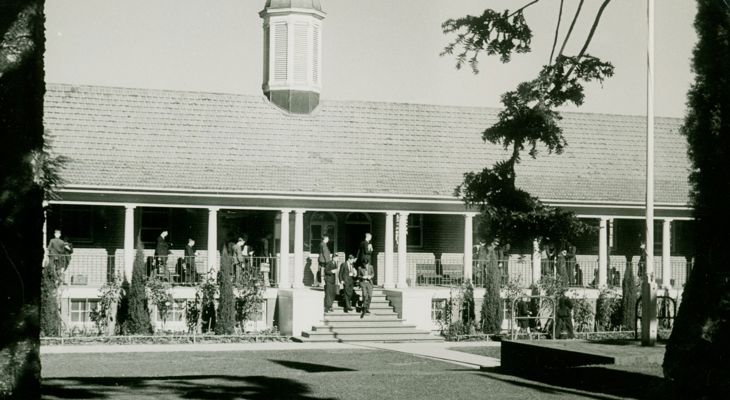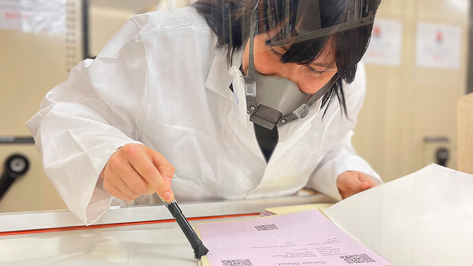From its humble beginning, Barker College was a school built on academic excellence, passion and camaraderie.
In 1890, whilst Rector at St Stephen’s Church, Kurrajong, Reverend Henry Plume tutored five local pupils for the Junior, Senior, and Matriculation Examinations. Their academic success encouraged him to establish his own school.
The following year, Plume moved to a guesthouse named Stokesleigh in Kurrajong Heights and named his new school Barker College in memory of the second Bishop of Sydney, Frederic Barker. Accepting 18 children in the first year, including four sisters of the Bowman family, the school allowed both day students and boarders to be taught.
By 1896, Rev. Plume and his wife Eleanor had decided to move their school to Hornsby due to a scarlet fever outbreak and the isolation of their current location. Many of the students followed and continued to excel under Plume’s contagious enthusiasm for teaching and learning along with his faith and care for student wellbeing.
During these early days there was no standard school uniform. However, as a concession to prevailing custom, he permitted the boys to wear a red and blue hat band, adopting the colours of Corpus Christi College at Cambridge University in England, where Plume had been a student. When the school moved to Hornsby in 1896, he allowed the cricket and football teams to wear red and blue colours when competing against local teams.
Seek Honour Above Rewards
The School Motto, Honor Non Honores, in translation is "Seek honour above rewards", and the first known use of this motto is on an illustrated farewell address to the Reverend and Mrs Plume in 1905, in which the motto is inscribed in red and blue. It said – “The high reputation of the School, its best traditions, the inspiration of our motto, Honor Non Honores, has been created, vivified and enhanced by your kindly ministrations”.
Since 1890, there have been nine Headmasters at Barker, each making an indelible and defining mark in the history of the School.
In 1905, the School was purchased by William Carter, who would remain the Headmaster until his retirement in 1929. Carter had ambitious plans for his new school. He wanted Barker College to become one of the Great Public Schools in Sydney and so he established sporting teams and school traditions that emulated the schools he most admired.
He encouraged the formation of the Old Boys' Union developed the school magazine The College Barker, introduced the striped School blazer that is still worn today by senior students, and introduced the School Crest. He was also a great supporter of Barker becoming a founding member of the Associated Schools of NSW (CAS) when it was established in 1929.
The outbreak of World War I resulted in over 230 old boys enlisting, with 23 paying the ultimate sacrifice. As a staunch believer in God, King and Country, Carter could not have been prouder of his past students. By the end of the Great War, Carter knew that Barker needed a permanent foundation and would not survive well into the future if it was still privately owned. For nearly thirty years, Barker was a privately owned ‘business’ – a boarding school for country and city boys. Part of his motivation for securing a more permanent future for the School was so that the old boys, who had so bravely and valiantly paid the supreme sacrifice in the War, would never be forgotten.
An Anglican School
On 11 November 1918, an agreement was signed between the Headmaster, William Carter and the Archbishop of Sydney, who transferred ownership of the School to the Anglican Church, effective 1 January 1919. The transfer of ownership solidified the strong Anglican tradition that had been established and maintained. A School Council was established to govern the running of the School to ‘ensure the continuity of conduct’ and with the support of the Anglican Church, there was also more ‘purchasing power’ to expand and embark on a building and land acquisition program.
During the Depression years, Barker's enrolment fell from 206 in 1929 to just 83 by 1933. Under the leadership of ‘The Wise Master Builder’ Headmaster, William Leslie, a program of expansion began. Leslie encouraged the purchase of various properties and the construction of a number of significant buildings and sporting facilities including Barker’s first swimming pool, assembly hall and Junior School.
World War II
The Barker College Preparatory School was created in 1944. In 1952 it was renamed the Barker College Junior School and in 1955 the completely separate War Memorial Junior School building, with junior boarding facilities, was opened.
During World War II, more than 60 Barker old boys lost their lives, including three of Leslie’s Head Prefects. This only confirmed his resolve to have the Chapel built and dedicated as a War Memorial. In 1957 the Barker College War Memorial Chapel was officially opened, and a dedication service held. This important occasion was not witnessed by Leslie who had unexpectedly died several months prior and whose memorial service was the first held in what was then a partially complete building.
Beyond the Mint Gates
Under Headmaster Trevor McCaskill, Barker College became the first independent school in Sydney to introduce a coeducational senior school. McCaskill’s vision at that time was to establish a senior school that prepared students for university and working life. In 1972 the Barker College Council endorsed the establishment of the Senior School on the existing Barker Campus, and in 1975, 59 girls were enrolled at Barker in Year 11. In 2022, the School completed the transition and is now fully coeducational from Pre-Kindergarten to Year 12.
In 2016, under the leadership of Headmaster, Phillip Heath, Barker has grown to include three Indigenous School campuses including Darkinjung Barker on the Central Coast, opened in 2016, Ngarralingayil Barker in the Lower Hunter, opened in 2020, and Dhupuma Barker in Northeast Arnhem Land, opened in 2021. Today, Darkinjung, Ngarralingayil, Dhupuma and Barker recognise the importance of upholding Aboriginal cultural identities as we strive to close the gap educationally. There is a shared vision of creating a two-way partnership where we can learn from one another in an educational model that is unique in Australia.
As they have before, and as they will again, each Barker student makes their own individual contribution to the school and leaves well-prepared to take their place in the world beyond the Mint Gates!



